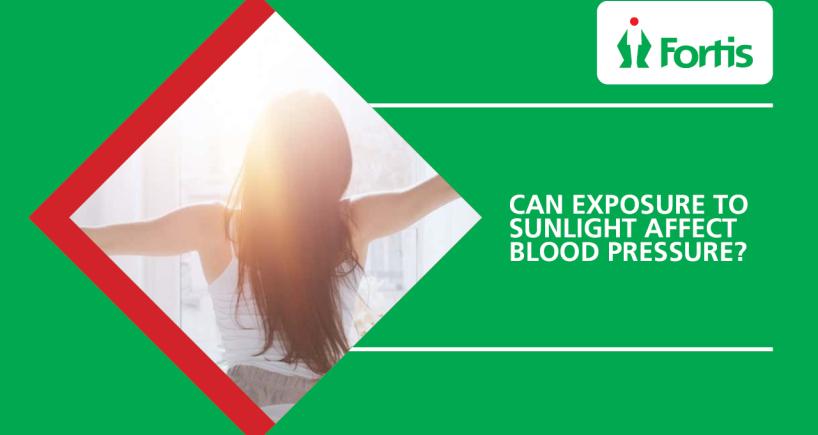
Can the Sun Raise your Blood Pressure?
Routine medical check-ups usually include getting your blood pressure checked. So, what do your blood pressure numbers signify and why is it so crucial to have this reading under control? Blood pressure is simply stated as the measurement of force used by your heart to pump blood through the circulatory system around your body.
One of the most common diseases affecting 1 in 3 adults worldwide is hypertension, which is high blood pressure. Hypotension, also known as low blood pressure usually occurs when the brain does not get enough blood, and can leave you feeling tired or dizzy.
Hypertension levels which are over 140/90 mm Hg, has been labelled the “silent killer” and the most common non-communicable disease (NCD) in India with a staggering rate of around 1.5 million deaths per year. A reading of 120/80 mm Hg is considered to be healthy and keeps you away from a list of life-threatening medical complications, the most important being heart attacks or strokes.
Hypertension is usually not very symptomatic and regular health checkups can determine if medication or a lifestyle change is needed. What are the symptoms of high blood pressure?
Blood Pressure Symptoms
- A headache or even a pounding in your ears can go unnoticed as a symptom of high blood pressure, as can weakness or a feeling of fatigue, shortness of breath, and sometimes blurry vision. If left untreated, hypertension can cause severe irreversible damage to your arteries slowly and surely, and this damage eventually results in heart failure.
- Medication is not always necessary to control hypertension. Weight loss and a healthy diet can improve your blood pressure readings drastically. Regular exercise, reduced quantities of sodium in your diet, cutting back on caffeine intake, and one of the most significant factors, is a reduction of stress levels.
Can the Sun Raise your Blood PressureInterestingly,
- Another interesting factor that can help lower your blood pressure is spending more time outdoors in the sun, which in turn helps lower your blood pressure. Overall blood pressure readings are usually higher in the winter due to the narrowing of blood vessels which in turn increases the pressure of blood flow.
- Exposure to sunlight has been shown to decrease blood pressure and increase blood flow which is extremely beneficial to our cardiovascular system. The top layers of the skin consist of nitric oxide and this compound reacts to sunlight which causes the blood vessels to expand due to the movement of oxide into the bloodstream. This causes a noticeable drop in blood pressure.
- Vitamin D, which is another important component in the human body is linked to the amount of sun exposure that a person receives. Studies show that individuals who have higher than normal levels of vitamin D in their bodies experience lower blood pressure readings and have a lower risk of developing hypertension in the future. Interestingly blood pressure levels do fluctuate depending on the season and environmental factors where the readings are at their all-time high during the colder months that is in winter.
- Observational studies have demonstrated that higher levels of sun exposure considerably reduce blood pressure levels in human beings. However, the most recent risk factor for hypertension could be insufficient exposure to natural ultraviolet radiation or deliberate avoidance of sunlight. Solar radiation has multiple positive benefits, one of the most important being the production of vitamin D in the skin. Multiple skin diseases such as psoriasis, localized scleroderma, vitiligo etc. can be successfully treated with solar radiation or artificial UV (ultraviolet) radiation. Another important and useful factor of UV exposure is an improvement of mood due to the release of endorphins in the body.
- Some of the most common autoimmune diseases such as asthma, diabetes mellitus, cardiovascular diseases like hypertension and myocardial infarction, cancers of the breast, bladder, ovaries etc. increase due to the lack of solar radiation exposure which leads to the deficiency of vitamin D.
- Vitamin D increases the absorption of calcium and phosphorus from food which plays an essential role in the development of bones, immunity, and blood cell formation.
Monitoring your blood pressure daily has become easier due to the availability of electronic blood pressure reading machines, and must be done regularly in more susceptible age groups. Increased levels of stress combined with an unhealthy diet and being overweight are some of the key contributing factors for the development of hypertension.
The good news is that hypertension is a reversible condition and can be controlled without the use of regular medication. It is advisable that once every two years, starting at the age of 20 your blood pressure must be evaluated by a physician. Drastic lifestyle changes are necessary if you have consistently high blood pressure levels, and one can start by conquering smaller goals such as regular exercise, lower levels of salt in food, a balanced diet, and a healthy BMI.
Quick Links
Neurology Hospital in Mumbai | Kidney Transplant Hospital in Mumbai | Cancer Hospital in Mumbai | Bone Marrow Transplant Hospital in Mumbai | Heart Hospital in Mumbai | Breast Cancer Hospital in Mumbai | Mouth Cancer Hospital in Mumbai | Anemia Hospital in Mumbai | Heart Failure Treatment in Mumbai | Emergency Hospital in Mumbai | Radiation Therapy in Mumbai | Eye Hospital in Mumbai | Kidney Cancer Hospital in Mumbai
Categories
Clear allMeet the doctor

- Cardiac Sciences | Interventional Cardiology
-
7 Years
-
1400



















